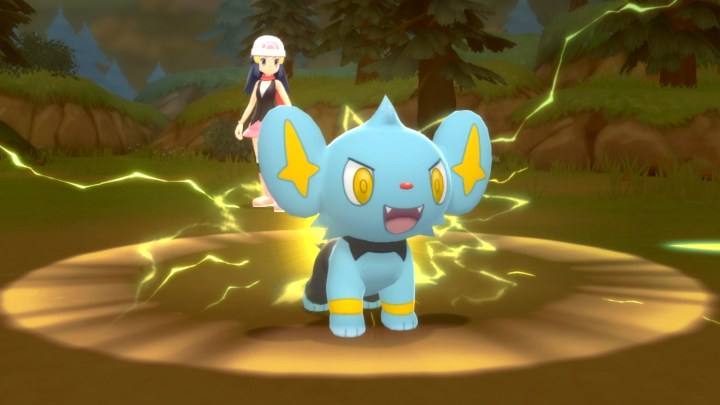Pokémon is one of the most accessible game franchises on the market. The simple concept of finding, catching, and battling monsters is easy enough for almost anyone to grasp. Sure, it is an RPG at heart with things like types, weaknesses, and advantages, but those are very easy to understand. Most players, even if they’ve never played another RPG before, will probably understand that fire attacks will hurt grass Pokémon more and water will hurt fire more. At the same time, Pokémon Brilliant Diamond and Shining Pearl also caters to the more hardcore crowd who enjoy really diving into the mechanics of the game’s battles.
EVs and IVs are two terms most casual players won’t know, or even really care about. EVs, or Effort Values, in particular are only important for people who either want to take their team of Pokémon into serious online battles or for those that just enjoy the idea of creating the most powerful version of your favorite pocket monster possible. Getting this deep into the systems can be a little intimidating, especially for those learning it for the first time, so we’ve put together this complete guide to EV training in Pokémon Brilliant Diamond and Shining Pearl.
See more
- How to level up fast in Pokémon Brilliant Diamond and Shining Pearl
- How to increase IVs in Pokémon Brilliant Diamond and Shining Pearl
- All Legendary Pokémon locations in Brilliant Diamond and Shining Pearl
What are EVs?

Effort Values, or EVs for short, are directly related to your Pokémon’s six primary stats. These are all well known and consist of HP, Attack, Defense, Special Attack, Special Defense, and Speed. Every time a Pokémon gains a level, you see those stats improve. Eventually, that stat will hit a maximum level you can improve it through normal leveling. This is where EVs and EV training come into play.
EVs are almost invisible to the player, which makes sense since it would be a little overwhelming and unnecessary to show to the majority of casual players. This hidden stat plays a huge role in your Pokémon’s potential, though. By earning EVs you can increase a Pokémon’s stats beyond that maximum level, but not to an unlimited degree. Any one Pokémon can only earn a maximum total of 510 EV points across their stats, with each one capping out at 252, so you can’t create a Pokémon with maximum EVs in every stat. At most, you can max out two stats with 6 EVs left over for the others.
How to find a Pokémon’s EV

Since the amount of EVs a Pokémon can get is limited, you will obviously want to see how they’re distributed first. Unfortunately, there’s no way to see the exact numerical breakdown of your Pokémon’s EVs, but instead, you can just get a general idea and work from there. To do so open up your menu, select Pokémon, choose the Pokémon you want to check, and select Check Summary. On this page tab over to the icon in the shape of a hexagon and press X to see a visual representation of their EVs.
While not ideal, this graph does show you how that Pokémon’s EVs have been distributed thus far. Also, if one stat has a star beside it, that means it is at the maximum EV level.
Different ways to train Pokémon EVs

Whether you know it or not, you’ll be earning EVs for all your Pokémon just by playing the game. This is both good and bad. It’s good in the sense that you can ignore it if you want and not suffer any negatives, but bad if you’re trying to specifically train your Pokémon in specific stats. You will automatically earn EVs every time you earn XP fighting another Pokémon, meaning you cause them to faint either in the wild or against an NPC trainer, or capture one in the wild. Competing against another human player, either locally or online, won’t earn you any EVs.
EVs, just like traditional XP, follow the same XP share system. Again, this is good for casual players but potentially bad for the hardcore since EVs will be earned by your entire party for every battle. If you’re training multiple Pokémon for the same EV, this is great, but if not you will want to only bring the Pokémon you want to get the specific EVs you’re grinding for along.
Now, unlike other stats, the EVs a Pokémon will get isn’t dependent on what Pokémon they are, but which Pokémon they defeat. So, if you’re trying to specifically train a Pokémon for, say, HP, there are specific Pokémon you will have to seek out and grind to boost that EV stat as opposed to any others. There are tons of charts out there with what Pokémon give what EVs, but we’ll just give you one for each stat we feel are fairly easy to encounter and grind, where to find them, and how many EVs they give for that stat:
- HP: Gastradon — Route 218 — 2 EVs
- Attack: Kricketune — Route 210 and Route 212 — 2 EVs
- Defense: Graveler — Iron Island and Mt. Coronet — 2 EVs
- Special Attack: Girafarig — Valor Lakefront — 2 EVs
- Special Defense: Tentacruel — Route 223 — 2 EVs
- Speed: Floatzel — Route 218 — 2 EVs
The highest amount of EVs a Pokémon can reward you is three, however, that almost always has the EVs split between multiple stats, making it harder to specifically train your Pokémon.
Once you know which Pokémon you’re training for what purpose, there are three ways you can further speed up EV training. These are through using different held items, Vitamins, and the Pokérus.
Held items

Pokémon Brilliant Diamond and Shining Pearl has a ton of different items you can give to your Pokémon as a held item that will give them different buffs. This includes a special set of seven items specifically made to increase how much EVs you gain per battle. The first is the most unique, but also the weakest of the bunch. The Macho Brace is great if you can’t yet access the other held items, or don’t have the specific one you need. When held, the Pokémon will get double the amount of EVs from any given battle. You can get the Macho Brace in Pastoria City. Head into a house just north of the Pokémart and talk to the Bug Catcher inside. If you can show him all three forms of Burmy, which translates to just having one of each kind in your party, he will give you this item for free.
The other six items all relate to boosting how many EVs you get for a specific stat. These are:
- Power Weight — Gives +8 HP EVs per fight.
- Power Bracer — Gives +8 Attack EVs per fight.
- Power Belt — Gives +8 Defense EVs per fight.
- Power Lens — Gives +8 Special Attack EVs per fight.
- Power Band — Gives +8 Special Defense EVs per fight.
- Power Anklet — Gives +8 Speed EVs per fight.
Eight extra EVs in any stat is way more than you could get with the Macho Brace, making these the ideal held items for grinding EVs. All of these items need to be purchased in the Battle Park. This area is only accessible after becoming the Champion and beating the Elite Four. Each one also costs 10 BP, so you will need to grind out some points to get them all.
Vitamins

Vitamins are a quick, easy, and straightforward way to give a bump to any Pokémon’s EV. You can find Vitamins around the world in many of the stores, such as the Department Store in Veilstone City. They are pricey, but each one you give a Pokémon will instantly give them 10 EVs in a given stat. The different Vitamins you can get are:
- HP UP — Gives 10 HP EVs.
- Protein — Gives 10 Attack EVs.
- Iron — Gives 10 Defense EVs.
- Calcium — Gives 10 Special Attack EVs.
- Zinc — Gives 10 Special Defense EVs.
- Carbos — Gives 10 Speed EVs.
Pokérus

Finally, there’s the Pokémon Virus or Pokérus for short. Unlike most viruses, this one is actually really good to catch and spread among your Pokémon. When infected, this virus works exactly like the Macho Brace and will double that Pokémon’s EV gains. Since it isn’t a held item, though, you can stack the effects of the Pokérus with one of the power items to gain tons of EVs in no time at all.
The only downside to this method is just how rare catching the Pokérus is. We can’t confirm the accuracy of these numbers, but most agree that the odds of catching the virus after any battle is 1 out of 21,845. Whether that number is exact or not, odds are very low. If you do manage to get it on one of your Pokémon, though, you can spread it to the rest of your party by continuing to battle more Pokémon. However, the virus won’t stay in an active state, where that Pokémon can spread it, forever. After about a day, again specifics seem to be fuzzy here, the infected Pokémon will no longer be contagious. Thankfully any Pokémon that caught the virus, whether it is active or not, retains the benefits of double EV gains permanently.
If you want to hold a Pokémon with an active Pokérus for longer, storing it in your PC will keep it in that active, infectious state perpetually. You will need to pull it out to use in battle to start spreading it to your party, though.
How to reset a Pokémon’s EVs

Because EVs have a limit, and you may have accidentally been earning EVs in the wrong stats for a Pokémon you want to start EV training, you will want to know how you can reset a Pokémon’s EVs to get a fresh start. There is a way, so you don’t have to get a fresh one and start from scratch. There are a set of very specific Berries in the game that function exactly like Vitamins, only in reverse. Each one you feed a Pokémon will reduce their EVs in that specific stat by 10. The Berries you’re looking for are:
- Pomeg Berry — Reduces HP EVs by 10.
- Kelpsy Berry — Reduces Attack EVs by 10.
- Qualot Berry — Reduces Defense EVs by 10.
- Hondew Berry — Reduces Special Attack EVs by 10.
- Grepa Berry — Reduces Special Defense EVs by 10.
- Tomato Berry — Reduces Speed EVs by 10.
Use these to fully maximize where you want all of the 510 possible EVs you can give your Pokémon to be the most effective it can be.



